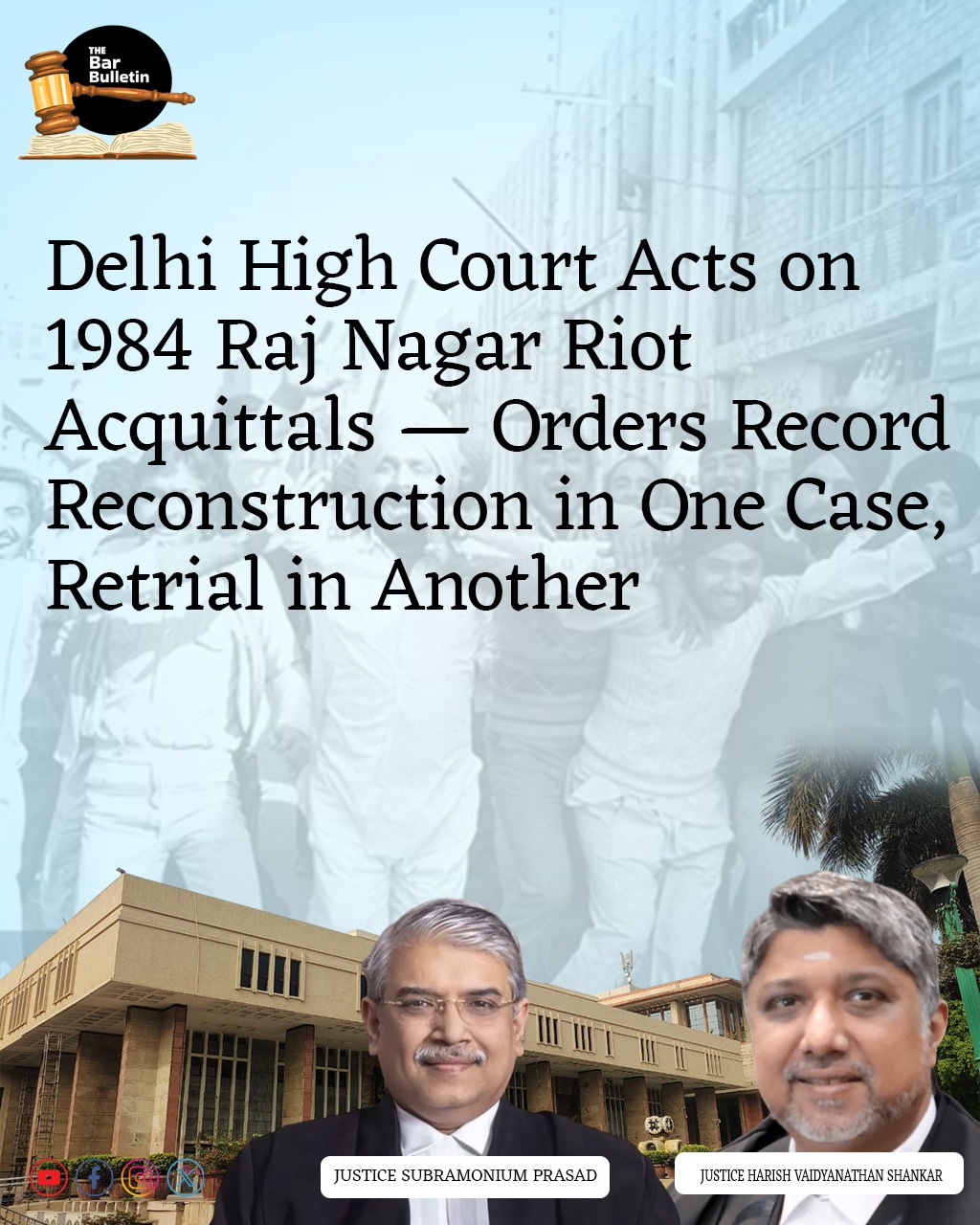The Delhi High Court has passed separate but related orders in criminal revision petitions arising from the November 1984 violence in the Raj Nagar area of Delhi, which followed the assassination of the then Prime Minister. Both matters concern incidents involving coordinated mob attacks on members of the Sikh community, resulting in multiple killings, arson, looting, and the destruction of religious institutions. Complaints filed by surviving family members described armed mobs surrounding their homes, setting property ablaze, and killing relatives in full public view. In certain instances, victims were allegedly lured out under the pretext of a compromise before being handed over to violent mobs.
In both cases, the original trials concluded within months in 1986 resulted in acquittals despite serious charges including murder, rioting, arson, and conspiracy. The High Court found grave investigative and judicial lapses: crucial eyewitnesses, including complainants, were never examined; summons were poorly served; and when process servers reported witnesses as “untraceable,” trial courts accepted this without invoking powers under the Code of Criminal Procedure or the Indian Evidence Act to compel attendance. Investigating agencies made no sustained effort to secure vital testimony, and key evidence was overlooked or never presented.
Subsequent connected prosecutions, pursued decades later by an independent agency, produced survivor testimony giving consistent, detailed accounts of mob orchestration, police inaction, targeted killings, and the burning of religious institutions. Survivors also recounted repeated relocations due to threats and, in some cases, false criminal cases that impeded their pursuit of justice. The High Court referred to the Supreme Court’s decision in State of U.P. v. Abhai Raj Singh (2004) 4 SCC 6, which permits retrial where the original proceedings were a farce and resulted in a miscarriage of justice, especially when material witnesses were not examined.
First Case (CRL.REV.P. 245/2017)
In one set of petitions, the Court has not yet set aside the acquittals. Instead, it recalled its earlier order reserving judgment to allow reconstruction of missing trial records. It directed the jurisdictional trial court to make best-endeavour efforts to retrieve or reconstruct the files from all possible sources including the CBI, the Supreme Court registry (in connection with pending appeals), archives of various Commissions, and the lawyers who participated in the original trials. All stakeholders, including investigating agencies, prosecutors, and defence counsel, have been instructed to extend full cooperation. A detailed report on the reconstruction exercise is to be filed before the next hearing on 1 September 2025, after which the Court will decide whether the acquittals should be overturned and retrials ordered.
Second Case (CRL.REV.P. 247/2017)
In the second matter, the Court went further and it set aside the 1986 acquittal after finding that the trial had been a sham, marked by complete failure to examine material witnesses and by perfunctory investigation. Applying the Abhai Raj Singh principle, the Court held that the combination of investigative neglect, prosecutorial inertia, and judicial passivity had subverted the very purpose of a fair trial. It ordered a retrial to be conducted after further investigation by an independent agency, with all surviving witnesses to be traced, protected, and examined. All remaining records have been ordered to be preserved, and the trial court has been directed to proceed expeditiously.
Conclusion:
In these linked 1984 riot matters, the Delhi High Court has signalled its determination to revisit past acquittals where there is evidence of miscarriage of justice. While one case awaits record reconstruction before any ruling on the acquittal, the other has already been sent back for retrial, underscoring the Court’s willingness to use its revisional powers to address historic investigative and judicial failures.
Appearances (Common Across Matters):
For the Petitioners / Amicus Curiae: Mr. Siddharth Aggarwal, Senior Advocate with Mr. Vishwajeet Singh, Mr. Karan Dhalla, and Mr. Japman Singh; Ms. Inderjeet Sidhu with Ms. Nazreena Sheikh.
For the Respondents (Accused): Mr. Rakesh Vatsa, Mr. Jeetin Jhala, Mr. Shakunt Jhala, and Ms. Reenila Jhala.
For the State: Mr. Laksh Khanna; Mr. Aashneet Singh, APP.
For the Complainants: Mr. H.S. Phoolka, Senior Advocate with Mr. Gurbaksh Singh, Ms. Surpreet Kaur, and Ms. Kamna Vohra.
For the CBI: Ms. Tarannum Cheema, Mr. Akash Singh, and Mr. Akshay N.
Appearances:
For the Petitioners (Court on its Own Motion / Amicus Curiae):
Mr. Siddharth Aggarwal, Senior Advocate (Amicus Curiae) with Mr. Vishwajeet Singh, Mr. Karan Dhalla, and Mr. Japman Singh, Advocates (in Crl. Rev. P. 245/2017 & 249/2017)
Ms. Inderjeet Sidhu, Advocate (Amicus Curiae) with Ms. Nazreena Sheikh, Advocate (in Crl. Rev. P. 246/2017)
For the Respondents (Accused):
Mr. Rakesh Vatsa, Mr. Jeetin Jhala, Mr. Shakunt Jhala, and Ms. Reenila Jhala, Advocates for one of the accused
For the State:
Mr. Laksh Khanna, Advocate (in Crl. Rev. P. 245/2017 & 246/2017)
Mr. Aashneet Singh, APP (in Crl. Rev. P. 249/2017)
For the Complainants:
Mr. H.S. Phoolka, Senior Advocate with Mr. Gurbaksh Singh, Ms. Surpreet Kaur, and Ms. Kamna Vohra, Advocates
For the CBI:
Ms. Tarannum Cheema, Mr. Akash Singh, and Mr. Akshay N., Advocates



